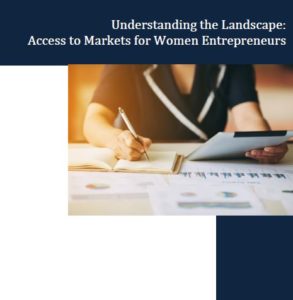Understanding the Landscape: Access to Markets for Women Entrepreneurs 
Library of Congress for National Women’s Business Council
First published May 2018
The National Women’s Business Council (NWBC) is the federal government’s only independent voice for women entrepreneurs. Its mission is to support groundbreaking research that provides insight into women’s business enterprises from startup to success and to use and share these findings to advise constructive action and policies at the federal level. The NWBC contracted with the Federal Research Division (FRD) of the Library of Congress for research and analytical support to help establish a firm foundation of knowledge concerning the major issues influencing women’s entrepreneurship and business ownership.
The goal of this report is to support the council in establishing a knowledge base about women business owners’, leaders’, and entrepreneurs’ access to markets for goods and services. This report represents a high-level situational analysis, exploring major issues and developments affecting women entrepreneurs to inform the NWBC’s framework for defining research priorities and engagement efforts.
The analysis in this report is based on a literature review of peer-reviewed research published in academic journals between 2010 and 2017 and written by scholars in business, economics, public policy, and other fields. It incorporates information from federal government reports and industry publications.
The report lays out the research findings through a so-called “PEST” framework, examining the existing research in terms of the political, economic, social, and technological factors that impact women business owners’ access to markets.
FRD provides customized research and analytical services on domestic and international topics to agencies of the U.S. government, the District of Columbia, and authorized federal contractors on a cost-recovery basis. This report represents an independent analysis by FRD and the author, who has sought to adhere to accepted standards of scholarly objectivity. It should not be construed as an expression of an official U.S. government position, policy, or decision.
Download Resource